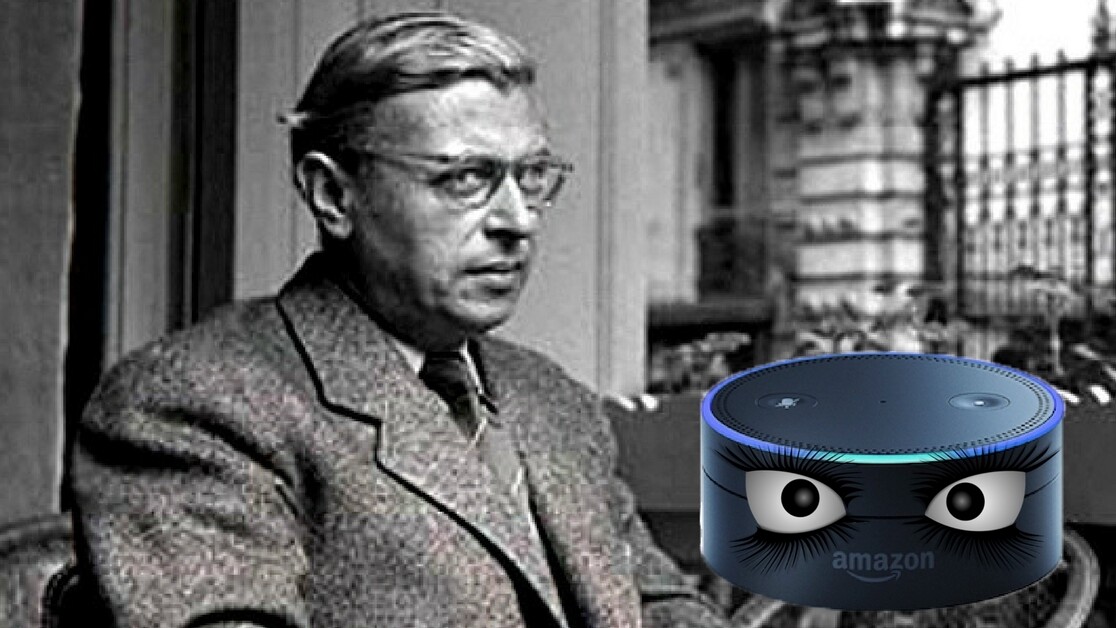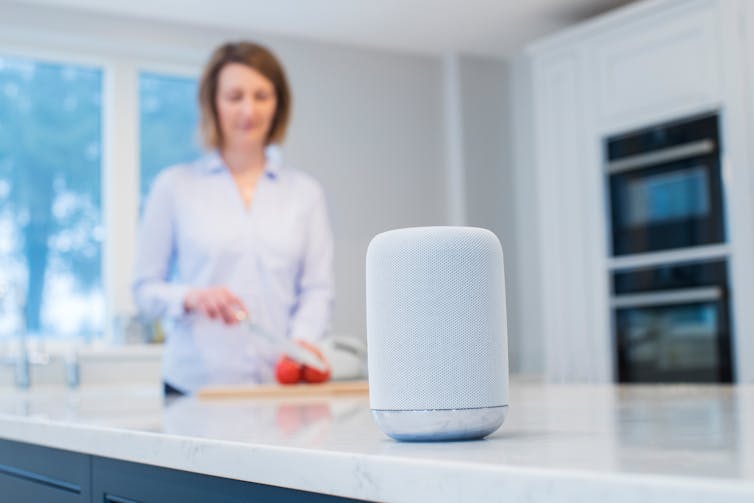
Alexa’s creepy laugh is far from the most worrying thing about her. This is despite the fact that Amazon’s digital assistant – which allows users to access the internet and control personal organization tools simply by speaking to the device – has been reported to spontaneously chuckle to herself. We shouldn’t be too concerned about her going rogue and turning on us either – a Terminator-style takeover by artificial intelligence doesn’t seem imminent.
But Alexa does pose one immediate threat. Rather than worrying about AI becoming more human, we should fear ourselves becoming more artificial by outsourcing important actions and decisions to devices like her.
This idea hasn’t been discussed much. Research suggests that the public’s main concern about AI is instead it becoming super intelligent and developing a mind of its own. Various prominent science and technology experts, such as the late physicist Stephen Hawking and the entrepreneur Elon Musk, have warned of the potential risks of such a scenario.
Yet Amazon and Google’s devices are popular and were on many Christmas wish lists in 2017. Apple’s ad for their new Homepod contender, directed by Spike Jonze, has been generating online chatter. AI is creeping ever further into our lives. Digital home assistants are just one part of this.
While the devices are intrusive – always listening in on our previously private spaces – many people find them worth it. They listen in so that they can learn on our behalf. They learn our routines and preferences and make recommendations for us.
As a result, these machines can simplify day-to-day tasks and make life that little bit more efficient. Expensive adverts illustrate how they can tell us the weather without looking out of the window and change the TV channel without reaching for the remote. They can also look up recipes, dim the lights, distract a bored child and so forth. Alexa and her ilk can even think for us. Whether you need knowledge, answers or memories – it can all be conjured up with a quick call and outsourced to the cloud.
Human inefficiency
But how are these devices affecting us? For starters, lots of physical and intellectual tasks are streamlined or done away with altogether. The idea is that this makes us more efficient.
And it seems to be working – AI can now monitor our workplace performance, our financial score and, just over the horizon, our social value – all in the name of improving productivity (one should ask, for whom?). It is also starting to look after our infants and elderly. It is selecting suitable romantic partners for us through apps. Perhaps the ideal partner might even be an artificial one.
But humans are not necessarily supposed to be efficient. We are messy, emotional, irrational creatures. Romantic interactions, for example, are often excruciating. But we push through in hope. Deciding what to do with the day is frequently impulsive, spur of the moment stuff. When throwing together whatever is left in the fridge, we sometimes come up with unexpectedly tasty new meals. Just being bored can similarly help us come up with cutting-edge ideas.

This may not be efficient, but it shows that there is value in mistakes and embarrassing situations. The experiences that make up life are not always easy or enjoyable. They can be physically and mentally exhausting. But it is through these experiences that we connect with others and ourselves. So are we outsourcing the very things that ultimately make us human?
Philosophical verdict
Existential philosophy gives a handle on this situation. Existentialism is a school of thought that considers what it means to be human, to be oneself and to be happy. Its central argument is that the absurdity and lack of meaning in life can make us unhappy. However, we can create meaning by searching for our “authentic self”. Authenticity may be interpreted as an ideal state of fulfillment, in which people can pursue their own independent destiny and be true to themselves.
According to existentialism, the notion of responsibility is central to living genuinely. The existentialist author Jean-Paul Sartre believed that each of us is the lone author of our decisions. We are nothing more than what we make of ourselves – the totality of our actions.
It is tempting to give up the burden of responsibility. But in not taking responsibility for our actions we also give up our freedom. Our identity and independent destiny become subsumed to another. Not only do we give up responsibility for our actions, but we limit our experiences and relationships.
For existentialists, individual destiny is rooted in these. Experiences, such as travel, can shake us out of our routines and give us space for self-reflection. Meanwhile, it is through the eyes of others that we catch sight of ourselves. Our interactions with others ultimately help us to establish who we are.
Alexa lessens all of these. She takes responsibility for our decisions to some extent. She regulates our experiences. She manages our relationships. Just consider the fact that AI is already getting involved in hiring staff – this is a clear example of how we are outsourcing important human decisions.
Where we gain in efficiency, we lose in spontaneity, serendipity and connectedness. From an existentialist perspective, digital assistants are dehumanising. They imply derogation of responsibility, detachment from experiences and disconnect from ourselves.
![]() By allowing circular bits of plastic to take off the rough edges, we seem to be unwittingly making our lives that much more artificial. An existentially authentic individual shows bravery in facing up to difficult choices. Unplugging Alexa and looking up at the sky to check the forecast might be a good first one to take.
By allowing circular bits of plastic to take off the rough edges, we seem to be unwittingly making our lives that much more artificial. An existentially authentic individual shows bravery in facing up to difficult choices. Unplugging Alexa and looking up at the sky to check the forecast might be a good first one to take.
Brendan Canavan, Senior Lecturer in Marketing, University of Huddersfield
This article was originally published on The Conversation. Read the original article.
Get the TNW newsletter
Get the most important tech news in your inbox each week.





